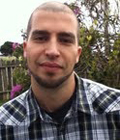
Host research mentor: Mark Zern
University of California, San Francisco
The current treatment for end stage liver disease is organ transplantation. The number of patients in need of a liver transplant far out weights number of donor livers available. Transplantation of hepatocytes from donor livers has been shown to correct liver disease in humans. Since human hepatocytes cannot be expanded in culture, this treatment still relies on the inadequate donor liver population. Our goal is to create a cellular therapy to repopulate the liver and rescue it from liver disease. This will be done by differentiation of human Embryonic Stem Cells to functional hepatocytes that are suitable for transplantation. In order for clinical studies to be undertaken the protocols must be amended so the undifferentiated and differentiate cells can be cultured without the use of animal products. We will attempt the optimization of feeder free and xeno free Embryonic Stem Cell culturing and derivation of functional hepatocytes. The goal is to create hepatocytes with 90% to 95% of the cells expressing liver specific genes and possess biotransformation abilities comparable to freshly isolated human hepatocytes that can repopulate mice livers. This will be done by characterizing the hepatocyte derivation potential of recently generated clinical grade ESC lines in xeno free conditions in comparison to H9.